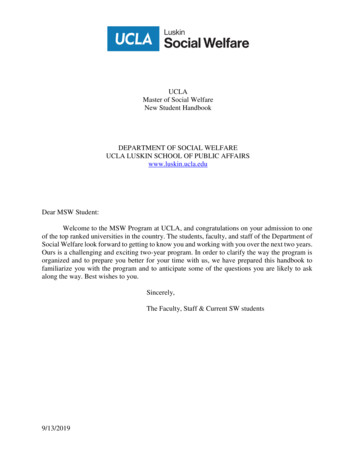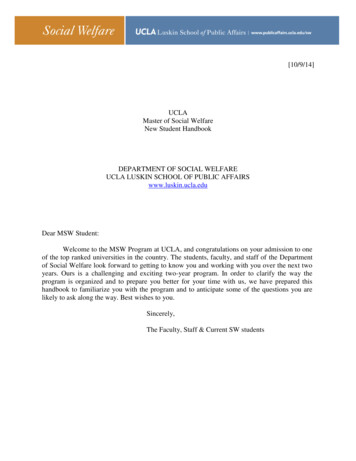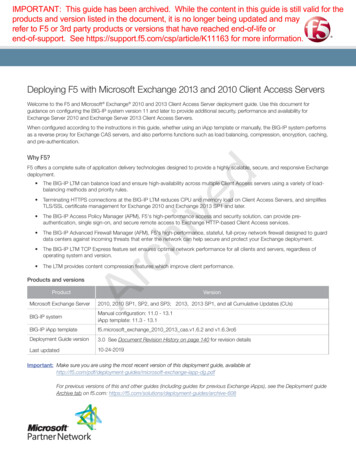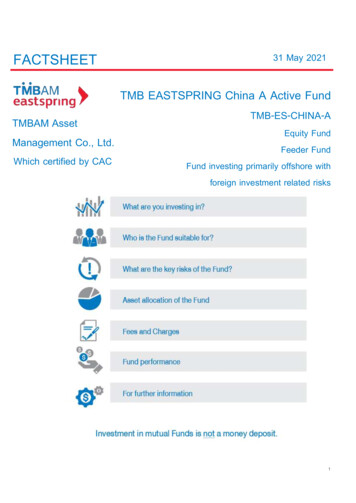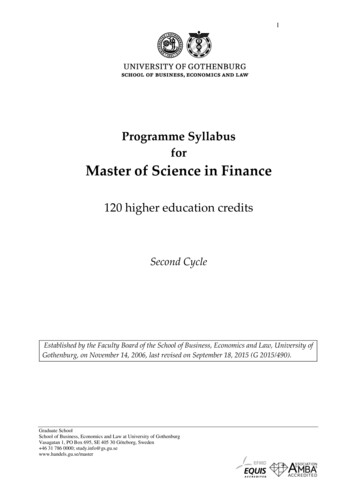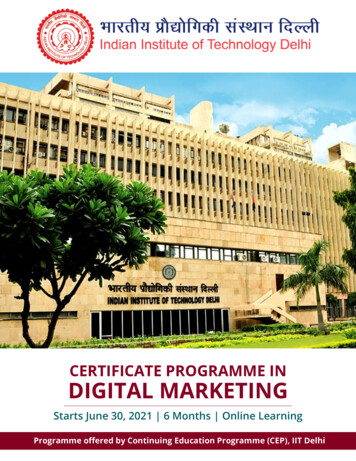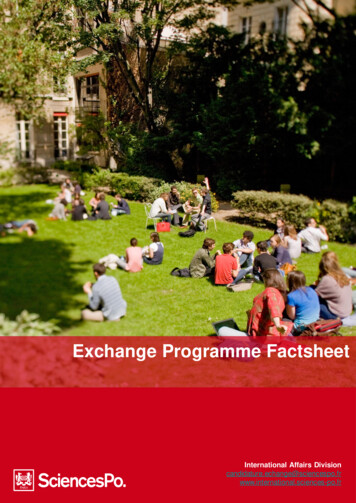
Transcription
Exchange Programme FactsheetInternational Affairs national.sciences-po.fr
Academic CalendarThe academic calendar is available on the Sciences Powebsite : Academic CalendarNB: Saturdays are potential class days and can be used for examinations. Students should therefore wait untilexamination dates are published (15 days after classes start) before planning vacations.Useful informationInternational Affairs Division’s Contats and location
The Sciences Po exchange programme (undergraduate and graduate) draws students from over 400 partneruniversities worldwide. Each year, Sciences Po’s staff, faculty welcome over 1500 exchange students, making theman important part of the student community and the university’s academic mission. Exchange students contribute toa dynamic learning environment composed of top-notch professors, researchers, professionals and an accomplishedstudent body.Students may participate in the Undergraduate Exchange Programme or the Graduate Exchange programme.Students may choose to study in English, in French or in both languages. Linguistic diversity is part of Sciences Po’sidentity: courses are taught in either French or English, and to a lesser degree, in other languages (particularly at theregional campuses). Sciences Po is therefore an excellent destination for students who are not French speakers (butfluent in English), and yet are interested in studying abroad in France.The Paris campus is located in the heart of Paris,close to the political centres of power and culturalattractions. It is composed of seventeenthand eighteenth-century buildings and its dquarters, publishing houses, the Assembléenationale. in short, many centres of French decisionmaking. Students are also exposed to the strongcultural flavor of the Saint Germain district: renownedcafés sheltering a new generation of philosophers, artgalleries and architecture, shops and cinemas, andrestaurants. World-class historical and culturalattractions (the Louvre, Notre Dame, Musée d’Orsay,the Sorbonne, the National Museum of the MiddleAges-Cluny) are all within walking distance.Paris campus: Map and directionsUndergraduate exchange students can choose from sixother regional campuses. These unique campuses offerthe same academic curriculum as the Paris campus, butintegrate area studies into their programmes. Generallyhalf of the student body comes from the region concerned.This contributes to a culturally rich and academicallystimulating environment that makes the regionalcampuses so distinctive. They will find at each campus aclose-knit community of students and faculty, excellentconditions for study, and a high level of support services.The cost of living is often lower in these smaller cities thanin Paris.Central and Eastern Europe Campus in DijonEurope-Asia Campus in Le HavreMiddle East and Mediterranean Campus in MentonEuropean Franco-German Campus in NancyEurope – Latin America Campus in PoitiersEurope – North AmericaCampus in ReimsPlease note that all graduate exchange students attend the Paris campus for the exchange programme.
Types of classesCours magistraux (French lecture courses)These lecture courses are animated by distinguishedprofessors and class sizes vary from 60 students to largelecture hall audiences. Evaluation is based on a finalsemester exam. A lecture course forms part of a moduleconsisting of lecture seminar course.Conférences de méthode (French seminar course)Each lecture course in French is associated with a seminarcourse on the same topic. These are interactive classes ofaround 20 to 25 students which meet for two hours a week.These classes are at the heart of a Sciences Po education.It is here that students are instructed in the methodology forwhich Sciences Po is so well-known and well-reputed. Thismethod concentrates on teaching students how to focus onwhat is essential, organise and prioritise arguments, andwrite and verbalise ideas clearly and simply. Activeparticipation is mandatory and a great deal of emphasis isplaced on oral expression. Evaluation is by continuousassessment.English lecture coursesThese classes are two hours a week and have a maximumenrolment of 60-70 students. These courses are moreinteractive than the traditional lectures in French, with ahalf-hour of each session reserved for questions anddiscussion on the readings. These courses also place astrong emphasis on written expression. Evaluation is bycontinuous assessment during the semester (essays) and awritten exam at the end of the semester. Each lecturecourse has a teaching assistant who is a specialist in thediscipline and is available to offer support and help studentsorganise their work.Electives (French or English)Electives meet for two hours a week and are organised inthe same way as the French seminar courses describedabove. However, they are not related to a lecture course.Emphasis is put on a close interaction with the professor.Evaluation is by continuous assessment.Foreign language coursesIt is strongly recommended for all non-francophonestudents to take a French language course. It is possible tostudy a second language, but in this case, students musttake a language previously studied at their home university.Language courses for exchange students are worth 5ECTS.SportsStudents can register for one sports class per semesterworth 2 credits. For more information, please contact theSports Association : association-sportive@sciencespo.fr orhttp://asscpo-paris.fr/. Students attending a campus outsideof Paris should contact the campus directly.Disciplines of study at Sciences PoSciences Po offers undergraduate exchange students sixdisciplines of study. Students may choose one discipline, orselect courses from a variety of disciplines: Economics,History, Humanities, International relations, Law, Politicalscience and journalism.Masters open to exchange studentsParis School of International Affairs (PSIA)European AffairsPublic policyCommunicationEconomic LawFinance and strategyHuman resources Management (fall semester only)MarketingRegional and urban strategies (fall semester only)Governing the large metropolis (fall semester only)Economic and businessMaster in Economics (research-oriented)Doctoral programmes : Research Masters in SociologyResearch Master in Political Science (comparative politicalsociology and political theory)Language levelsUndergraduate and graduate exchange students can takecourses taught in French, in English or in a mixture of bothFrench and English. In order to guarantee that all exchangestudents master at least one of Sciences Po’s teachinglanguages, all exchange students whose native language orwhose language of instruction in their home university isneither French nor English are required to provide evidenceof an official test in either French or in English.French language requirements for undergraduateexchange students TCF minimum score 400 orDELF/DALF minimum score B2English language requirements for undergraduateexchange students IELTS minimum score 6 or TOEFLminimum score 87 or Cambridge First Certificate (FCE) Bminimum, or Cambridge Certificate in Advanced English(CAE) C minimum or Cambridge Certificate of Proficiency inEnglish (CPE) minimum Pass CFrench language requirements for graduate exchangestudentsTCF minimum score 500 or DELF/DALF minimum score C1English language requirements for graduate exchangestudents ELTS minimum score 6,5 or TOEFL minimumscore 100 or Cambridge Certificate in Advanced English(CAE) C minimum or Cambridge Certificate of Proficiency inEnglish (CPE) minimum Pass CThe language self-assessment system will still exist incertain cases. Please consult the International AffairsDivision website for further information.Students who wish to take a French or other languagecourse must indicate their language level. Students are notpermitted to take a foreign language class at completebeginners level. This does not include French foreignlanguage classes.
Certificate in Social Sciences and HumanitiesIn order to obtain the Certificate in Social Sciences andHumanities, undergraduate exchange students must followthe recommended programme of 5 courses including alecture course.Students studying for a full academic year must take 30ECTS per semester (60 ECTS in total) and validate aminimum of 45 ECTS.Students staying for one semester must take 30 ECTS andvalidate a minimum of 20 ECTS.Evaluation and GradingGrading at Sciences Po is on a scale of 0 to 20. Eachclass is graded separately, and a minimum grade of 10 isrequired to pass a course. Sciences Po uses also theEuropean Credit Transfer System (ECTS). In additionto the grades obtained in the courses, students receiveanother grade according to the ECTS. This grade isgiven as follows:Academic rules and regulationsAttendanceAs class participation is an integral part of the academicprogramme, attendance in class is mandatory. Any absencemust be justified to the professor and the administrativeteam responsible for the programme of study. More thanthree absences per semester will result in automatic default(“défaillance”) of the coursePunctualityStudents are expected to arrive in class on time. Excessivetardiness is considered as an absence.Exam AttendanceStudents must be vigilant of their exam dates and respectthese obligations by being present at any midterm or finalexams. No rescheduling of exams is permitted except underexceptional circumstances (i.e. medical reasons justified bya doctor’s certificate). A missed exam can result in a default,meaning the course credits are not obtained.No Add and Drop PolicyOnce the semester begins, students will not be allowed tocancel (“drop”) a course from their registered semestercourse load, except under exceptional circumstances. If astudent abandons the class, a default will automaticallyappear on their final transcript.Intellectual HonestyPlagiarism is prohibited and severely sanctioned.AuditingStudents are not authorized to audit classes at Sciences Po.They must be registered in the course in order to attend.ECTSGradeStudentsNormallyachieving thegrade (%)Athe highest10% of a classEXCELLENT –outstandingperformanceBthe following25 %VERY GOOD - above theaverage standardCthe following30 %GOOD - generally sound workDthe following25 %SATISFACTORY - fairEthe last 10% ofa classSUFFICIENT – performancemeets minimum criteriaFX (*)F (*)DefinitionFAIL - passing level not obtainedFAIL - level considerably belowpassingOnly grades ranging between 10 and 20 are ranked(*) : At Sciences Po, the grade range of 9.00 and 9.50 out of20 is entered for the ECTS FX grade, and under 9.00 out of20.00 is entered for the F grade.Other gradesDéfaillant (Default)Usually indicates eitherexcessive absences of absencefrom the final examReport (Postpone)The student had to reschedulethe exam for justified medicalreasonsValidé (Pass)Sports electives onlyNon validé (Not validated)Sports electives only
Grade transcriptsEligibility criteriaExchange students have access to their grades onlinethrough their Sciences Po online area. A transcript isprovided to all partner universities by post.Please note that grades are usually available in thestudent’s Sciences Po online area 6-8 weeks after the endof the semester and grade transcripts are sent by post afterthis date. Contact: candidature.echange@sciencespo.frFor grade transcripts to be sent to partner universities,please note that all students must have previouslycompleted the teachers 'online evaluation in their SciencesPo online area as well as having finalized theiradministrative registration at Sciences Po.Undergraduate Exchange Programme: All applicantsmust have successfully have completed at least foursemesters of university study before studying at SciencesPoGraduate exchange programme : All applicants musthave successfully obtained a Bachelor degree or itsequivalent (or at least three full years of study in highereducation) before studying at Sciences PoApplication process1st step : Online application by partner universityAll partner universities must nominate their exchangestudents online at the following address:https://scolarite.sciences-po.fr (We do not acceptnominations by email)Partner universities can nominate their students for the Fallsemester in early Spring and for the Spring semester in theearly Fall.Partner universities will be informed of the procedure tofollow by email and will receive a reminder of their User IDand password. Partner universities are also invited toconsult the user guide which explains how to nominatestudents.The following information is required by partner universitiesto nominate a student online:Last name, first name and email addressNumber of semesters (one or two)Programme (Undergraduate or Master)Campus (for Undergraduate exchange students only)Information on the majors required for undergraduatestudents attending the Paris campusSpecifiy who will pay for the Welcome Programme(university or student)2nd step : Online application for studentsStudents will receive an automatic email once nominatedsuccessfully online by their home university and will beinformed that they must complete an online application andupload the required supoorting ng documents1. Curriculum Vitae (in English or in French)2. Covering letter outlining the reasons for wanting to studyat Sciences Po3. Photo4. University grade transcripts5. Official language results (if applicable)Partner universities can consult the advancement oftheir students’ applications online (please see thepartner university user guide)Outcome of exchange applicationStudents will be informed of their acceptance to theexchange programme by email once the application hasbeen checked and accepted by the International AffairsDivision. The partner university will be on copy of theacceptance email.Students will receive confirmation of their Sciences Po userID and password in their acceptance email which will allowthem to connect to their Sciences Po online area. Studentscan access a provisional acceptance certificate in Pdfformat.Important informationActivation Sciences Po email accountOnce accepted as an exchange student, all students mustquickly activate their Sciences Po email account byconnecting to the following PrcValmLoginStudents will need to enter their student number (ID) andtheir password. The Sciences Po email address iscomposed of: firstname.lastname@sciencespo.frPlease read the guide on how to activate the Sciences Poemail account.Sciences Po online areaStudents should familiarize themselves with their SciencesPo online area. Once accepted as an exchange student,students can accept their offer of admission, download aprovisional acceptance certificate, begin their administrativeregistration and register for courses online. Students shouldconnect with their student number (ID) and password.Welcome programmeStudents may take part in Sciences Po’s Welcomeprogramme organised at the beginning of each semesterfor international students. The programme is optional andrequires a fee and registration. It operates on a first-come,first-served basis. Students must register and pay throughtheir online area: https://scolarite.sciences-po.fr.Participation is only guaranteed once payment has beenreceived.Universities who pay for their students’ participation in theWelcome programme will be invoiced at the beginning ofthe semester.Student attending a campus outside of Paris should contactthe campus directly to see if an orientation programme isorganised.For further information regarding the Welcome programmeplease consult the Internatinal Affairs’ Division’s website:http://www.international.sciences-po.fr/en
Important informationAcceptance lettersAcceptance letters will be sent directly to all partneruniversities after the deadline has passed for completedstudent applications for the exchange programmeContact: candidature.echange@sciencespo.frCourse registrationDates for course registration will be published on theSciences Po website : agogiques. Precise class schedulesare only made available at the time of online registration.All undergraduate exchange students are required to readcarefully the undergraduate exchange programme webpages which explain the course programme, course content,ECTS credits and main contacts.Masters students should consult the following es-mastersStudents accepted to campuses outside Paris shouldcontact the regional campus directly :http://college.sciencespo.frStudents should also become familiar with the academicregulations at Sciences Po. Please urge your students toread the following document carefully: Academic rules andregulations.Places in classes are distributed on a first-come, first-servedbasis and many courses will close for registration when theyreach their full capacity. Students should have several backup choices for each course they wish to take.For students attending the undergraduate exchangeprogramme in Paris, partner universities shouldindicate if their students are obliged to take the majorityof their courses in one or two specific majors. Forexample, if your student is required to take all their coursesin History or in International Relations and Economics, youmust indicate this when nominating your student online.Students who do not have any specific academic obligationsin their home university should indicate their preferredmajors at Sciences Po.Administrative registrationAdministrative registration is mandatory for all exchangestudents.Students must register online through their Sciences Poonline area. Applications should no longer be sent by post.For further Information, students should consult the studentsupport services website: ing-at-sciences-poStudents without a permanent address should indicate 9 ruede la Chaise, 75007, Paris as their address.Social securityRegistration is valid for the whole year and costs 211 Euros(2013-14). Students from the European Economic Areawho are holders of the European health insurance card areexempt. Students under 28 years old from a countryoutside the European Economic Area must subscribe to thestudent social security system and pay for it, whether theyhave private insurance or not. Students will be required topay for French student social security at the same time asapplying for their student card. For further sidence permit (titre de séjour)All students coming to study at Sciences Po for longer than3 months who come from a non-EU member state mustapply for a residence permit in order to reside in France.Sciences Po has put in place a liaison service between thepolice (“La Préfecture de Police de Paris”) and theInternational Affairs Division.Please be aware that this service is only available forstudents applying for residence permits that live in the cityof Paris. Students living outside of Paris, in the GreaterParis region (Ile-de-France), should check out theinformation published on the website of their local policeheadquartersAccommodation OfficeSciences Po's Accommodation Office provides studentswith information and advice can put students in contact withorganisations or individuals renting accommodation.Contact: info.logement@sciencespo.frThe Sciences Po Students' Union (Bureau des Elèves,BDE) receives many accommodation offers fromindividuals that can be accessed by students afterregistering for the association (10 euros/year). See the website : http://bdescpo.info/Students with disabilitiesSciences Po provides facilities that allow all students with adisability to fully participate in life at the university.For further information, please contact Cla
science and journalism. Masters open to exchange students Paris School of International Affairs (PSIA) European Affairs Public policy Communication Economic Law Finance and strategy Human resources Management (fall semester only) Marketing Regional and urban strategies (fall semester
